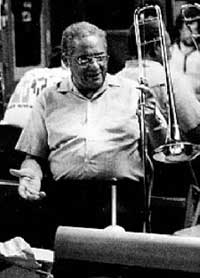Masterclass with Grover Mitchell: Advice for Lead Trombonists

|
|
Photograph by Lesley Peacock |
To be a lead trombone player, you must have, number one, a very good sound, and number two, a strong melodic concept. After all, you are standing on top of the section and defining the melodic approach. I think that the best lead players are usually very good basic players. Tone, concept and intonation - these are a must.
You also need good technique, because you never know what these writers are going to write for you. But technique is the means to play music with - it's just a tool. You can get so wrapped up in technical things, like speed and range, that you lose the basic nature of the instrument. The trombone is a very beautiful instrument and the prettier range, to me, is from G on the staff to the G over top of the staff - that's the meat range of the trombone.
In brass instruments, teachers always encourage you to use a syllable in order to make your notes sound good. For example, the old players would say, "ah." Other players use the "e" sound, but I found out that these usually are guys who mostly tried to play high. The "e" makes you close your throat and gives you a pinched sound.
Then the famous opera singer, Leontyne Price, caught my attention. She used to sing these long, hard phrases, and when she got into the higher register, she still maintained a roundness in her tones. They didn't thin out. That's where I adopted the "o" syllable that I use in my playing.
The "o" syllable keeps your throat open, so I maintain it throughout the horn, whatever the register is. Whether it's low, middle, or high, if you think the "o" syllable, it will open your throat and help you achieve a nice, pretty, round sound. It's a little tougher when you try to maintain this in the high register, but it's worth it - you know you're going have a good-sized sound no matter how high you have to play.
Of course, to play lead parts you've got to have a good range. You can solidify and increase your range by a very simple method - long tones. This is a wondrous device. Not only can it increase your range and the beauty of your tone, but it also improves your intonation, because you're always aware of where the note is.
At this stage of my life, the three things that I know I have to keep up are long tones, lip slurs, and scales. All of these things are essential for lead players - really all players - in developing their sound and technique. Lip slurs not only improve your flexibility, they increase your strength and also improve your tone.
When I talk about scales, I don't mean you have to play them at racehorse tempos. Just practice scales at reasonable tempos through all the keys. This will keep your intonation intact and it also helps your execution and articulation. You have to be aware, whatever you are playing, however hip it is, of keeping a clean articulation.
But, as I said, along with tone and technique, you have to develop your musical concept. I've got a theory about increasing musicality that everybody finds kind of weird, but for me it works. When I was on the road with Count Basie I used to sit on the bus and hour after hour I would sing to myself, actually sing out loud.
I noticed that when you try to sing the phrases that you have to play on your instrument, it can be very, very hard, at first, in terms of breath control and taking in the air and expending air. You might be breaking the phrases in the wrong place. But the more you sing them, you'll begin to see how the phrases should be, and you'll improve your breath control at the same time. This will help you develop the kind of strong musical concept you need as a lead player. In other words, what you're doing vocally, if you do it enough, will transfer to the instrument.
An important part of being a lead player is knowing how to lead. I don't care how established or respected you might be, when you can't listen to the other guys in the section you're in big trouble. You've got to remember, you're working with two to four other good players, and you're silly to think you've got a license on the musical concept. In some cases you just have be the amplifier through which everybody thinks.
But then again, sometimes you do have to be a real dictator when you see things are falling apart. You've got to have a kind of personality - I don't want to say arrogant - but you have to think that you can pull it together. It's like that old thing, a dog can sense your fear of him. The nature of man or animal is that the strongest shall lead, and when you have shown that you are not the strongest, then you are going to get led.
Finally, a lead trombone player has to work with the lead trumpet and lead alto. Sometimes you can get some friction between the lead players - there's a lot of ego involved here. The guys might not want to listen to what you have to say, and you might not want to listen to what they have to say. But in the end you have to come to some kind of agreement. We're talking about the ensemble - that's the main thing.
© Bob Bernotas, 1992; revised 2000. Used by permission. All rights reserved.
